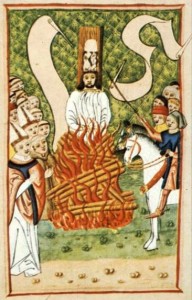The lives and concerns of those who lived in the past can often seem remote and irrelevant. In this, the 600th anniversary year of his martyrdom, what does John Hus mean to us?
The Rev. Dr. Craig Atwood has observed that John Hus and Pope Francis would probably get along very well together. Like the present pontiff, Hus wished to “return the church to its divine mission of servanthood.” He believed the corrupting, worldly influence of wealth and power grievously hindered the church’s mission of proclaiming God’s unconditional, liberating grace. His frequent preaching on themes of reform and social justice were warmly received by the peasantry and rising middle class of 15th century Bohemia (located in the present day Czech Republic). Pope Francis’ appeal is akin to the esteem in which commoners held John Hus.
The church in Hus’ time had few financial problems. Secular authorities had granted it the right to collect a 10% tax of income, crops or livestock. Payment was enforced by the possibility of excommunication. Those who were excommunicated were denied pastoral care and access to the sacraments, which at that time included burial and marriage. To speak to one who was excommunicated, to sell them anything, or offer them employment was to risk excommunication oneself. Hus spoke out strongly against this practice of linking spiritual care to one’s ability to pay and believed that the practice went against the clear teaching of Christ. He also attacked moral lapses among clergy colleagues such as fornication and the keeping of mistresses. How could laity trust the spiritual guidance of clergy if the latter were compromised by greed and lust?
Hus and his followers were among the first to break the close relationship of church and state characteristic of the medieval European society. Hus maintained that the church should challenge the policies of secular authorities whenever these conflicted with God’s will. Policies which benefit the wealthy and powerful at the expense of the poor and middle class are not faithful to the teaching of Christ and must be opposed. Leaders of the church should not serve as cheerleaders or fundraisers for national military action but rather follow Christ’s command to love and pray for their enemies (Matthew 5:44.)
Hus’ uncompromising moral stance and polemics alienated those who benefited materially from the status quo. His prophetic words are potentially as inflammatory today as in 1415.
– Pastor Derek French

